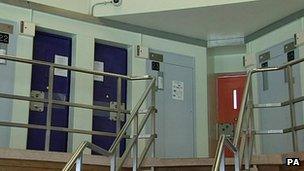Feltham Young Offender Institution 'unacceptably violent'
- Published

Feltham Prison and Young Offender Institution, was labelled 'unacceptably violent'
A young offender institution has been labelled "unacceptably violent" by inspectors who found "unprecedentedly high" use of batons by staff.
Feltham Prison and Young Offender Institution, in west London, witnessed on average almost two fights or assaults every day, a report, external said.
Some of the fights were "very serious", HM Inspectorate of Prisons found.
The National Offender Management Service said it showed the "disturbing but accurate" challenges staff face.
Andrew Neilson, director of campaigns at the Howard League for Penal Reform, said: "This is the worst inspection report of its kind we have seen in a decade.
"If you want to see the effects of keeping hundreds of troubled boys cooped up in a prison, you need look no further than Feltham."
'Staff overwhelmed'
Feltham is divided into two parts - Feltham A holds children and young people, mostly aged 16 or 17, while Feltham B holds young adult men aged 18 to 21.
Chief inspector of prisons Nick Hardwick said: "Feltham as a whole is an unacceptably violent place.
"Despite excellent work in some cases, staff were unable to prevent a high number of very concerning incidents that carried a significant risk of serious injury.
"Staff were sometimes overwhelmed by the challenges they faced," he added.
"As a consequence, some of their responses, such as the prolonged use of isolation on the children and young people's side and the use of batons on the young adult side, were unacceptable."
Mr Hardwick told BBC Radio 4's Today programme: "As numbers in custody of young people has fallen, those that remain are the most troubled and staff are struggling to cope with that.
"If you were a parent with a child in Feltham, you'd be terrified."
Many young people told inspectors they were frightened and had little confidence in staff to keep them safe.
Self-harming behaviour remained high among young adults and emergency cell bells were not answered quickly, the report said.
'Frighten us all'
National Offender Management Service (Noms) chief Michael Spurr told the programme: "The levels of violence [are] higher than any of us would want to see.
"It paints a disturbing but accurate picture of the challenges that staff at Feltham are facing on a daily basis."
He added: "The young people who come into Feltham are troubled. Half are coming in for violent offences, many have got long-standing gang affiliations, and managing that challenging population has been incredibly difficult."
He said batons were used 25 times last year - a higher number than in any other prison. However, they were not used on individuals aged under 18.
He said to make the institution safer, those on remand would be moved elsewhere so that staff could spend more time with those who had been convicted.
"They [inmates] are safe but we want to make them as safe as possible. You can't totally remove harm from anywhere," he added.
Prison Reform Trust director Juliet Lyon said: "Feltham should frighten us all.
"Why do we place our most vulnerable and volatile young people in our most troubled institutions, and expect anything other than the violence, self-harm and mayhem this report reveals?"
'Constant fear'
Kenny Imafidon, 20, spent six months at Feltham on remand for murder before he was acquitted.
Mr Imafidon, who wrote the Kenny Report on gang violence which was submitted to parliament, said: "The tensions from outside continue in prison, so what you're doing is creating a breeding ground for that violence to take place.
"How can people rehabilitate themselves and change their lives and ways when there living in constant fear for their own safety?"
In January, former prisoner Aaron French told the BBC he had witnessed violence while doing a cleaning job at the institution.
"Me and about six other guys, we spent our days going round prison cleaning up mess, cleaning up the blood spills, suicides, sex offenders being burnt with kettle water and sugar and things like that," he said.
- Published24 January 2013
- Published19 April 2012
- Published29 February 2012
- Published16 November 2011
- Published21 October 2011
- Published20 October 2011